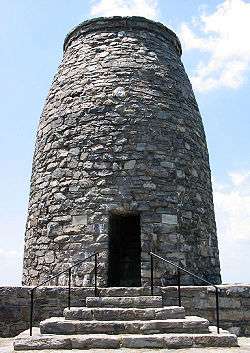South Mountain (Maryland and Pennsylvania)
| South Mountain | |
|---|---|
 Northward view of South Mountain in Maryland | |
| Highest point | |
| Peak | Quirauk Mountain |
| Elevation | 2,150 ft (660 m) |
| Coordinates | 39°41′46″N 77°30′47″W / 39.696°N 77.513°W |
| Dimensions | |
| Length | 70 mi (110 km) |
| Width | 12 mi (19 km) |
| Geography | |
 Appalachian Mountains | |
| Country | United States |
| States | Maryland and Pennsylvania |
| Range coordinates | 39°43′N 77°29′W / 39.72°N 77.49°WCoordinates: 39°43′N 77°29′W / 39.72°N 77.49°W |
| Parent range | Blue Ridge Mountains |
| Geology | |
| Orogeny | Grenville orogeny |
| Type of rock | Granite, gneiss and limestone |
South Mountain is the northern extension of the Blue Ridge Mountain range in Maryland and Pennsylvania. From the Potomac River near Knoxville, Maryland, in the south, to Dillsburg, Pennsylvania, in the north, the 70-mile-long (110 km) range separates the Hagerstown and Cumberland valleys from the Piedmont regions of the two states. The Appalachian National Scenic Trail follows the crest of the mountain through Maryland and a portion of Pennsylvania.
Geography
South Mountain begins at the Potomac River as a low, narrow ridge, barely one mile wide and only 1,200 feet (370 m) above sea level at its crest. South of the Potomac River in Virginia, the ridge continues as Short Hill Mountain for about 12 miles (19 km) before subsiding near the town of Hillsboro. South Mountain in Maryland gradually grows higher and wider towards the north. Near the Pennsylvania border, the mountain merges with the hills of the parallel Catoctin Mountain range to the east and becomes more like a low mountain range than a single crest. North of U.S. Route 30 in Pennsylvania, the South Mountain highlands reach their greatest width, over 12 miles (19 km), and several summits top 2,000 feet (610 m). The mountain then turns more to the east and becomes a series of small rocky hills between Mount Holly Springs and the northeastern end of the mountain at Dillsburg.
Major summits
Maryland
From south to north:
- Lambs Knoll, 1,758 feet (536 m) above sea level
- Monument Knob, 1,540 feet (470 m)
- Bartman Hill, 1,400 feet (430 m)
- Pine Knob, 1,714 feet (522 m)
- Buzzard Knob, 1,520 feet (460 m)
- Quirauk Mountain, 2,150 feet (660 m) - highest point on South Mountain in Maryland
Pennsylvania

From south to north, then east:
- Mount Dunlop, 1,720 feet (520 m)
- Monterey Peak, 1,663 feet (507 m)
- Clermont Crag 1,627 feet (496 m)
- Wildcat Rocks, 1,772 feet (540 m)
- Virginia Rock, 1,818 feet (554 m)
- Buzzard Peak/Chimney Rocks, 1,946 feet (593 m)
- Snowy Mountain, 2,090 feet (640 m)
- Green Ridge, 1,980 feet (600 m)
- Mount Newman, 1,784 feet (544 m)
- Piney Mountain, 1,904 feet (580 m)
- Big Pine Flat Ridge, 2,100 feet (640 m) - highest point on South Mountain in Pennsylvania
- Big Flat Ridge, 2,065 feet (629 m)
- East Big Flat Ridge, 2,070 feet (630 m)
- Mount Holly, 1,504 feet (458 m)
- Long Mountain, 1,583 feet (482 m)
- Center Point Knob, 1,075 feet (328 m)
- White Rocks, 1,105 feet (337 m)[1]
Gaps
Maryland
From south to north:
- Crampton's Gap, 930 feet (280 m), between Burkittsville and Gapland
- Fox's Gap, 1,070 feet (330 m), between Middletown and Boonsboro
- Turner's Gap, 1,071 feet (326 m), between Middletown and Boonsboro, traversed by U.S. Route 40 Alternate
- pass near Bartman Hill, 1,250 feet (380 m), traversed by Interstate 70 and U.S. Route 40
- Harman Gap (Oeiler's Gap), 1,570 feet (480 m), east of Cavetown
Pennsylvania
From south to north:
- Monterey Gap, 1,330 feet (410 m), at Blue Ridge Summit (see also Fairfield Gap)
- Pass near Mount Newman, 1,380 feet (420 m), traversed by U.S. Route 30
State reservations
Maryland
From south to north:
- South Mountain State Park, length of the ridge crest in Maryland
- Gathland State Park, Crampton Gap
- Washington Monument State Park, near Boonsboro
- Greenbrier State Park, near Boonsboro
Pennsylvania
From south to north:
- Michaux State Forest, covering most of the mountain
- Caledonia State Park, east of Fayetteville
- Pine Grove Furnace State Park
Conservation
In Pennsylvania, the region surrounding is the focus of a Conservation Landscape Initiative, led by the Pennsylvania Department of Conservation and Natural Resources (DCNR) and the Appalachian Trail Conservancy. The initiative is organized as South Mountain Partnership, which involves other organizations, government, business, and community members.
History
The Battle of South Mountain was fought on the mountain at Crampton's, Fox and Turner's gaps during the Maryland Campaign of the American Civil War in 1862. In 1863, military engagements of the Gettysburg Campaign on the mountain range included the Fight at Monterey Pass near the Mason–Dixon Line.
References
- ↑ U.S. Geological Survey 7½ topographic maps